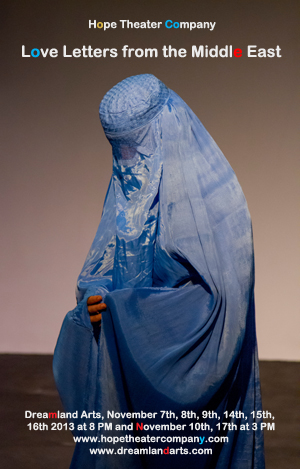 “Love letters from the Middle East” is based, at least in the version we had the chance to see here at Flipt Festival in Fara in Sabina, on an extremely clear specularity.
“Love letters from the Middle East” is based, at least in the version we had the chance to see here at Flipt Festival in Fara in Sabina, on an extremely clear specularity.
On one side of the mirror are the stories of Afghan and Iraqi women forced to wear the burqa and prisoners of a slew of social conventions that, in our world, have become a matter of debate only at the time of the attack on the Twin Towers before they slipped again into a viscous oblivion.
On the other side of the mirror it is the destiny of American women (exemplified by Angela’s story) who await the return of husbands sent a world away to fight a war which passing time has transformed into a distorted habit.
The specularity of worlds and cultures, each gazing into the abyss of the other to discover the unfathomable depths of its own, is based mainly on reasons that are internal to the narrative.
Both narrative segments that divide the work into two temporally distinct but limpidly interconnected parts, are in fact based on the theme of traveling, moving towards, tending to.
The first part tells the story of the journey of Middle Eastern women to our west, specifically London, which becomes the pivot around which is woven like a tapestry the fate of women who, as retribution for their attempt to reject the conventions of their own country, have had their faces disfigured with scalding oil – almost a last-ditch effort by the native culture to carve into their flesh that awful veil (which still is paradoxically often esthetically beautiful) that they tried to tear away.
The issues with obtaining approval for their visas, without which the women necessarily would have to return to the land from which they had fled, exposes how much the Western world really cares about their predicament. They become, with their faces disfigured and their downtrodden lives, potential material for a show that only appears to offer them a sounding board for venting the pain that has remained for so long a prisoner of that veil, but that, in reality, is just the light of a fleeting spotlight, that does not help them secure that visa or attain the results they long for so much. A light that can easily be confused, for those like them who have become blind, with that of a window opened on the vacuum of a fate from which escape is seemingly impossible. All this is expressed in the form of monologue by Emily Rose Duea, through a painful kaleidoscope of characters that she wears like a veil and renders in their fragile nudity.
The second part features instead Angela’s journey (Meredith Larson is exemplary in portraying the disorientation of the western traveler) in the war zones in search of his Mike, missing in action, and probably dead. This journey sets up a painful encounter with the otherness amid the clash of civilizations that is still ongoing.
Both trips are built upon the unstable material of dreams and hope. For the characters, getting on the road literally comes from the need to break out of that prison of conventions which has been built around them: the burqa, as in the case of Afghan women, but also the equally claustrophobic, though invisible, veil of the habits of the Western world with its never ending stress of working, making money, and spending it.
Physical and metaphorical prisons become temporal perceptions punctuated by the sound of the clock and the fatal chime of London’s Big Ben, or Angela’s absurd awareness of the existence of another part of the world where it is night when for her it’s daytime. Desperate irreconcilability of opposites.
The two parts of the show are sewn together by the encumbering reality of video projections of real women disfigured by scalding oil, that besides providing a clean break between the two parts of the narration, activates a process of mirroring between performance and spectator.
“Love letters from the Middle East” rests on an absolutely essential direction that, by putting the text in the middle of the performance, encloses it in extremely rigid and geometric trajectories. It’s a true prison for the spectator’s eyes, with no way out, that allows the whole story to move the pedal for a sequence of harsh and painful tones that takes your breath away.
Perhaps an ironic counterpoint, or some act of breaking away, could have pushed the play in a more distinctly polyphonic dimension. But it would have probably also diminished the impact of the narrative, which knowingly addresses a deaf audience that either ignores or still insists on not to wanting to hear this kind of stories.
Translated from original italian
Source: Close-up
(Love letters form Middle East);
Text: Kiomars Moradi and Porya Azarbayjani
Translation: Cynthia Dekay
Direction: Kiomars Moradi
Actress: Emily Rose Duea, Meredith Larson
Music: Maryam Ershadi Yusefzadeh
Multimedia and video arts: Kiomars Moradi and Farshid Akhlaghi
Production: Hope Theare (Minnesota/Iran)
